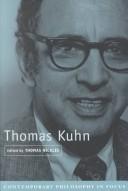| Listing 1 - 10 of 15 | << page >> |
Sort by
|
Book
ISBN: 1317490126 1317490134 1315710838 1282534564 1844653064 9786612534560 9781844653065 9781317490135 1902683102 1902683110 9781902683119 9781902683102 9781317490128 9781315710839 9781282534568 6612534567 Year: 2000 Publisher: Durham : Acumen Publishing,
Abstract | Keywords | Export | Availability | Bookmark
 Loading...
Loading...Choose an application
- Reference Manager
- EndNote
- RefWorks (Direct export to RefWorks)
Thomas Kuhn (1922-96) transformed the philosophy of science. His seminal 1962 work The Structure of Scientific Revolutions introduced the term "paradigm shift" into the vernacular and remains a fundamental text in the study of the history and philosophy of science. This introduction to Kuhn's ideas covers the breadth of his philosophical work, situating The Structure of Scientific Revolutions within Kuhn's wider thought and drawing attention to the development of his ideas over time. Kuhn's work is assessed within the context of other philosophies of science notably logical empiricism and recent developments in naturalized epistemology. The author argues that Kuhn's thinking betrays a residual commitment to many theses characteristic of the empiricists he set out to challenge. Kuhn's influence on the history and philosophy of science is assessed and where the field may be heading in the wake of Kuhn's ideas is explored.
Science --- Philosophy. --- History. --- Kuhn, Thomas S.
Book
ISBN: 9780226317205 022631720X 9780226317038 022631703X 9780226317175 022631717X Year: 2016 Publisher: Chicago : University of Chicago Press,
Abstract | Keywords | Export | Availability | Bookmark
 Loading...
Loading...Choose an application
- Reference Manager
- EndNote
- RefWorks (Direct export to RefWorks)
Thomas S. Kuhn's The Structure of Scientific Revolutions was a watershed event when it was published in 1962, upending the previous understanding of science as a slow, logical accumulation of facts and introducing, with the concept of the "paradigm shift," social and psychological considerations into the heart of the scientific process. More than fifty years after its publication, Kuhn's work continues to influence thinkers in a wide range of fields, including scientists, historians, and sociologists. It is clear that The Structure of Scientific Revolutions itself marks no less of a paradigm shift than those it describes. In Kuhn's "Structure of Scientific Revolutions" at Fifty, leading social scientists and philosophers explore the origins of Kuhn's masterwork and its legacy fifty years on. These essays exhume important historical context for Kuhn's work, critically analyzing its foundations in twentieth-century science, politics, and Kuhn's own intellectual biography: his experiences as a physics graduate student, his close relationship with psychologists before and after the publication of Structure, and the Cold War framework of terms such as "world view" and "paradigm."
Science --- Science. --- Wissenschaftsphilosophie. --- History. --- Philosophy. --- Kuhn, Thomas S. --- Kuhn, Thomas S., --- Structure of scientific revolutions (Kuhn, Thomas S.). --- Philosophy --- Science - Philosophy --- Kuhn, Thomas S. - Structure of scientific revolutions --- philosopher of science, thomas kuhn, scientific revolutions, paradigm shift, 20th century, american, philosophy, philosophical, usa, united states, knowledge, objective criteria, incommensurable, history, psychology, considerations, sociology, development by accumulation, progress, puzzle solving, anomalies, copernican revolution, irrational, humanism.
Book
ISBN: 1315537427 1134983948 1134983875 9781134983940 9781134983872 9781134984015 1134984014 9781315537429 9781138689763 Year: 2016 Publisher: London
Abstract | Keywords | Export | Availability | Bookmark
 Loading...
Loading...Choose an application
- Reference Manager
- EndNote
- RefWorks (Direct export to RefWorks)
Literature --- History and criticism --- Theory, etc. --- Kuhn, Thomas S. --- Bloom, Harold. --- Derrida, Jacques.
Book
ISBN: 023114668X 9780231146685 9780231146692 9780231520744 0231520743 0231146698 Year: 2018 Publisher: New York, NY : Columbia University Press,
Abstract | Keywords | Export | Availability | Bookmark
 Loading...
Loading...Choose an application
- Reference Manager
- EndNote
- RefWorks (Direct export to RefWorks)
Thomas Kuhn's The Structure of Scientific Revolutions is one of the most important books of the twentieth century. Its influence reaches far beyond the philosophy of science, and its key terms, such as "paradigm shift," "normal science," and "incommensurability," are now used in both academic and public discourse without any reference to Kuhn. However, Kuhn's philosophy is still often misunderstood and underappreciated. In Kuhn's Legacy, Bojana Mladenović offers a novel analysis of Kuhn's central philosophical project, focusing on his writings after Structure.Mladenović argues that Kuhn's historicism was always coupled with a firm and consistent antirelativism but that it was only in his mature writings that Kuhn began to systematically develop an original account of scientific rationality. She reconstructs this account, arguing that Kuhn sees the rationality of science as a form of collective rationality. At the purely formal level, Kuhn's conception of scientific rationality prohibits obviously irrational beliefs and choices and requires reason-responsiveness as well as the uninterrupted pursuit of inquiry. At the substantive, historicized level, it rests on a distinctly pragmatist mode of justification compatible with a notion of contingent but robust scientific progress. Mladenović argues that Kuhn's epistemology and his metaphilosophy both represent a creative and fruitful continuation of the tradition of American pragmatism. Kuhn's Legacy demonstrates the vitality of Kuhn's philosophical project and its importance for the study of the philosophy and history of science today.
Science --- Paradigm (Theory of knowledge) --- Philosophy. --- Kuhn, Thomas S. --- Knowledge, Theory of --- Normal science --- Philosophy of science
Book
ISBN: 0226922707 Year: 2018 Publisher: Chicago ; London : The University of Chicago Press,
Abstract | Keywords | Export | Availability | Bookmark
 Loading...
Loading...Choose an application
- Reference Manager
- EndNote
- RefWorks (Direct export to RefWorks)
In 1972, philosopher of science Thomas Kuhn threw an ashtray at Errol Morris. This book is the result. At the time, Morris was a graduate student. Now we know him as one of the most celebrated and restlessly probing filmmakers of our time, the creator of such classics of documentary investigation as The Thin Blue Line and The Fog of War. Kuhn, meanwhile, was—and, posthumously, remains—a star in his field, the author of The Structure of Scientific Revolutions, a landmark book that has sold well over a million copies and introduced the concept of “paradigm shifts” to the larger culture. And Morris thought the idea was bunk. The Ashtray tells why—and in doing so, it makes a powerful case for Morris’s way of viewing the world, and the centrality to that view of a fundamental conception of the necessity of truth. “For me,” Morris writes, “truth is about the relationship between language and the world: a correspondence idea of truth.” He has no patience for philosophical systems that aim for internal coherence and disdain the world itself. Morris is after bigger game: he wants to establish as clearly as possible what we know and can say about the world, reality, history, our actions and interactions. It’s the fundamental desire that animates his filmmaking, whether he’s probing Robert McNamara about Vietnam or the oddball owner of a pet cemetery. Truth may be slippery, but that doesn’t mean we have to grease its path of escape through philosophical evasions. Rather, Morris argues powerfully, it is our duty to do everything we can to establish and support it. In a time when truth feels ever more embattled, under siege from political lies and virtual lives alike, The Ashtray is a bracing reminder of its value, delivered by a figure who has, over decades, uniquely earned our trust through his commitment to truth. No Morris fan should miss it.
Book
Year: 2016 Publisher: Edition Open Access
Abstract | Keywords | Export | Availability | Bookmark
 Loading...
Loading...Choose an application
- Reference Manager
- EndNote
- RefWorks (Direct export to RefWorks)
The publication of Thomas S. Kuhn’s "Structure of Scientific Revolutions" in 1962 stands for a turning point in the history and philosophy of science. The repercussions of this work have rearticulated the theoretical framework of history and philosophy of science and have also generated discussions that contributed to the formation of the communities of historians as well as philosophers of science in many parts of the world. Different approaches to history of science have since emerged and most of them have the "Structure" as their reference point. In October 2012, a conference at the Max Planck Institute for the History of Science brought together some of the historians of science whose work has played a decisive role in the ways history of science has evolved as a field of research in the past 50 years, both intellectually and institutionally. This volume gathers reflections by many of these historians on the history of the history of science, based on the presentations and discussions at the conference. The topics covered range from personal recollections of working with Thomas Kuhn to broad overviews of the historical development of the history of science as a discipline in the past half-century. The series Proceedings of the Max Planck Research Library for the History and Development of Knowledge presents the results of scientific meetings on current issues and supports further cooperation on these issues via an electronic platform. The volumes are available both as print-on-demand books and as open-access publications on the Internet. The material is freely accessible online at www.edition-open-access.de.
Science --- Philosophy --- Historiography --- History --- Kuhn, Thomas S. --- Thomas S. Kuhn --- philosophy of science --- MPRL --- Edition Open Access --- Structures of Scientific Revolutions --- historiography --- history of science

ISBN: 0521796482 0521792061 1107129834 9786610421381 051117019X 0511067240 0511060939 0511297270 0511613970 128042138X 1139146823 0511069375 9780511067242 9780511613975 9780511069376 9780521792066 9780521796484 9781107129832 6610421382 9781139146821 9780511060939 9780511297274 Year: 2003 Publisher: Cambridge : Cambridge University Press,
Abstract | Keywords | Export | Availability | Bookmark
 Loading...
Loading...Choose an application
- Reference Manager
- EndNote
- RefWorks (Direct export to RefWorks)
Contemporary Philosophy in Focus offers a series of introductory volumes to many of the dominant philosophical thinkers of the current age. Thomas Kuhn (1922-96), the author of The Structure of Scientific Revolutions, is probably the best-known and most influential historian and philosopher of science of the last 25 years, and has become something of a cultural icon. His concepts of paradigm, paradigm change and incommensurability have changed the way we think about science. This volume offers an introduction to Kuhn's life and work and then considers the implications of Kuhn's work for philosophy, cognitive psychology, social studies of science and feminism. The volume is more than a retrospective on Kuhn, exploring future developments of cognitive and information services along Kuhnian lines. Outside of philosophy the volume will be of particular interest to professionals and students in cognitive science, history of science, science studies and cultural studies.
Science --- Philosophy. --- Kuhn, Thomas S. --- #KVHA:Filosofie --- #KVHA:Wetenschapsfilosofie --- Normal science --- Philosophy of science --- Philosophy --- Kʻo-en, --- Kʻu-en, --- Kuhn, T. S. --- Kʻung-en, --- קון, תומאס ס. --- كون، توماس --- Kuhn, Thomas Samuel, --- Arts and Humanities

ISBN: 1281292141 9786611292140 1441148353 1847141943 9781847141941 9781281292148 082648591X 9780826485915 9781847141941 Year: 2005 Publisher: London ; New York : Continuum,
Abstract | Keywords | Export | Availability | Bookmark
 Loading...
Loading...Choose an application
- Reference Manager
- EndNote
- RefWorks (Direct export to RefWorks)
The influence of Thomas Kuhn (1922 -1996) on the history and philosophy of science has been truly enormous. In 1962, Kuhn's famous work, The Structure of Scientific Revolutions , helped to inaugurate a revolution - the historiographic revolution - in the latter half of the twentieth century, providing a new understanding of science in which 'paradigm shifts' (scientific revolutions) are punctuated with periods of stasis (normal science). Kuhn's revolution not only had a huge impact on the history and philosophy of science but on other disciplines as well, including sociology, education, econom
Science --- Philosophy --- History. --- Kuhn, Thomas S. --- Kʻo-en, --- Kʻu-en, --- Kuhn, T. S. --- Kʻung-en, --- קון, תומאס ס. --- كون، توماس --- Natural science --- Natural sciences --- Science of science --- Sciences --- Philosophy&delete& --- History --- Kuhn, Thomas Samuel,
Multi
ISBN: 9781107012233 1107012236 9780511997990 9781107632905 1107632900 9781139161640 1139161644 051199799X 9786613342614 6613342610 9781139157834 1139157833 9781139157834 9781139159593 1139159593 1139153072 9781139153072 1283342618 9781283342612 1139160648 9781139160643 1139156071 9781139156073 110722909X Year: 2011 Publisher: Cambridge : Cambridge University Press,
Abstract | Keywords | Export | Availability | Bookmark
 Loading...
Loading...Choose an application
- Reference Manager
- EndNote
- RefWorks (Direct export to RefWorks)
Kuhn's Structure of Scientific Revolutions (1962) has been enduringly influential in philosophy of science, challenging many common presuppositions about the nature of science and the growth of scientific knowledge. However, philosophers have misunderstood Kuhn's view, treating him as a relativist or social constructionist. In this book, Brad Wray argues that Kuhn provides a useful framework for developing an epistemology of science that takes account of the constructive role that social factors play in scientific inquiry. He examines the core concepts of Structure and explains the main characteristics of both Kuhn's evolutionary epistemology and his social epistemology, relating Structure to Kuhn's developed view presented in his later writings. The discussion includes analyses of the Copernican revolution in astronomy and the plate tectonics revolution in geology. The book will be useful for scholars working in science studies, sociologists and historians of science as well as philosophers of science.
Science --- Knowledge, Theory of. --- Social epistemology. --- Philosophy. --- Kuhn, Thomas S. --- Structure of scientific revolutions (Kuhn, Thomas S.). --- Epistemology, Social --- Knowledge, Theory of --- Social role --- Knowledge, Sociology of --- Epistemology --- Theory of knowledge --- Philosophy --- Psychology --- Normal science --- Philosophy of science --- Kʻo-en, --- Kʻu-en, --- Kuhn, T. S. --- Kʻung-en, --- קון, תומאס ס. --- كون، توماس --- Épistémologie --- Kuhn, Thomas Samuel, --- Arts and Humanities --- Kuhn, thomas samuel (1922-1996) --- Progrès scientifique et technique

ISBN: 9781107637238 0521855756 9780521855754 9780511498404 9780511221279 0511221274 0511220367 9780511220364 9780511219306 051121930X 0511498403 051121930X 1280480416 9781280480416 9780511219986 0511219989 1107155460 9786610480418 0511314655 1107637236 Year: 2006 Publisher: Cambridge : Cambridge University Press,
Abstract | Keywords | Export | Availability | Bookmark
 Loading...
Loading...Choose an application
- Reference Manager
- EndNote
- RefWorks (Direct export to RefWorks)
Thomas Kuhn's Structure of Scientific Revolutions became the most widely read book about science in the twentieth century. His terms 'paradigm' and 'scientific revolution' entered everyday speech, but they remain controversial. In the second half of the twentieth century, the new field of cognitive science combined empirical psychology, computer science, and neuroscience. In this book, the theories of concepts developed by cognitive scientists are used to evaluate and extend Kuhn's most influential ideas. Based on case studies of the Copernican revolution, the discovery of nuclear fission, and an elaboration of Kuhn's famous 'ducks and geese' example of concept learning, this volume, first published in 2006, offers accounts of the nature of normal and revolutionary science, the function of anomalies, and the nature of incommensurability.
Paradigm (Theory of knowledge). --- Cognition --- Constructivism (Philosophy) --- Paradigm (Theory of knowledge) --- Science --- Knowledge, Theory of --- Philosophy --- Psychology --- History --- Kuhn, Thomas S. --- Kʻo-en, --- Kʻu-en, --- Kuhn, T. S. --- Kʻung-en, --- קון, תומאס ס. --- كون، توماس --- Cognition. --- Constructivism (Philosophy). --- Kuhn, Thomas Samuel, --- Arts and Humanities --- Science - Philosophy - History - 20th century --- Science - History - 20th century --- Kuhn, Thomas Samuel, - 1922-1996
| Listing 1 - 10 of 15 | << page >> |
Sort by
|

 Search
Search Feedback
Feedback About
About Help
Help News
News